History of Russia: Lenin's Revolutionary Tactics Analysis
VerifiedAdded on 2022/08/22
|6
|1238
|14
Essay
AI Summary
This essay delves into the pivotal role of Vladimir Lenin's tactics in the Russian Revolution. It examines Lenin's strategic acumen, highlighting his ability to analyze situations and make decisive moves. The essay explores his contributions to Marxism and his advocacy for the working class. It details his leadership of the Bolsheviks, his opposition to the war, and his efforts to gain support from the poor farmers. The essay analyzes his tactical maneuvers, including his use of propaganda and his understanding of class struggle. It underscores the importance of Lenin's leadership in the Bolsheviks' rise to power and his success in implementing their ideology. The essay concludes by emphasizing Lenin's lasting impact on Russian social history and his legacy as a brilliant revolutionary leader.
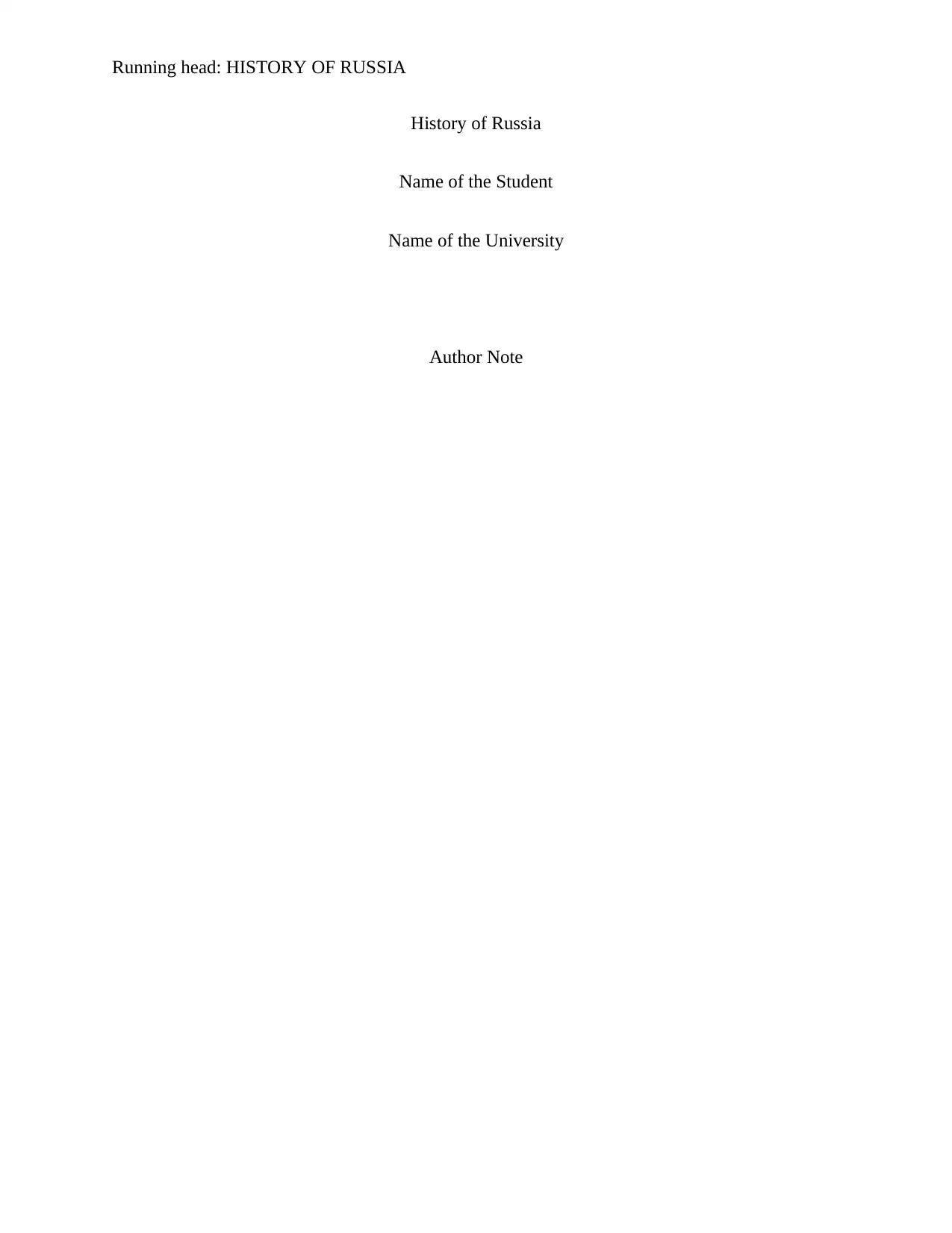
Running head: HISTORY OF RUSSIA
History of Russia
Name of the Student
Name of the University
Author Note
History of Russia
Name of the Student
Name of the University
Author Note
Paraphrase This Document
Need a fresh take? Get an instant paraphrase of this document with our AI Paraphraser
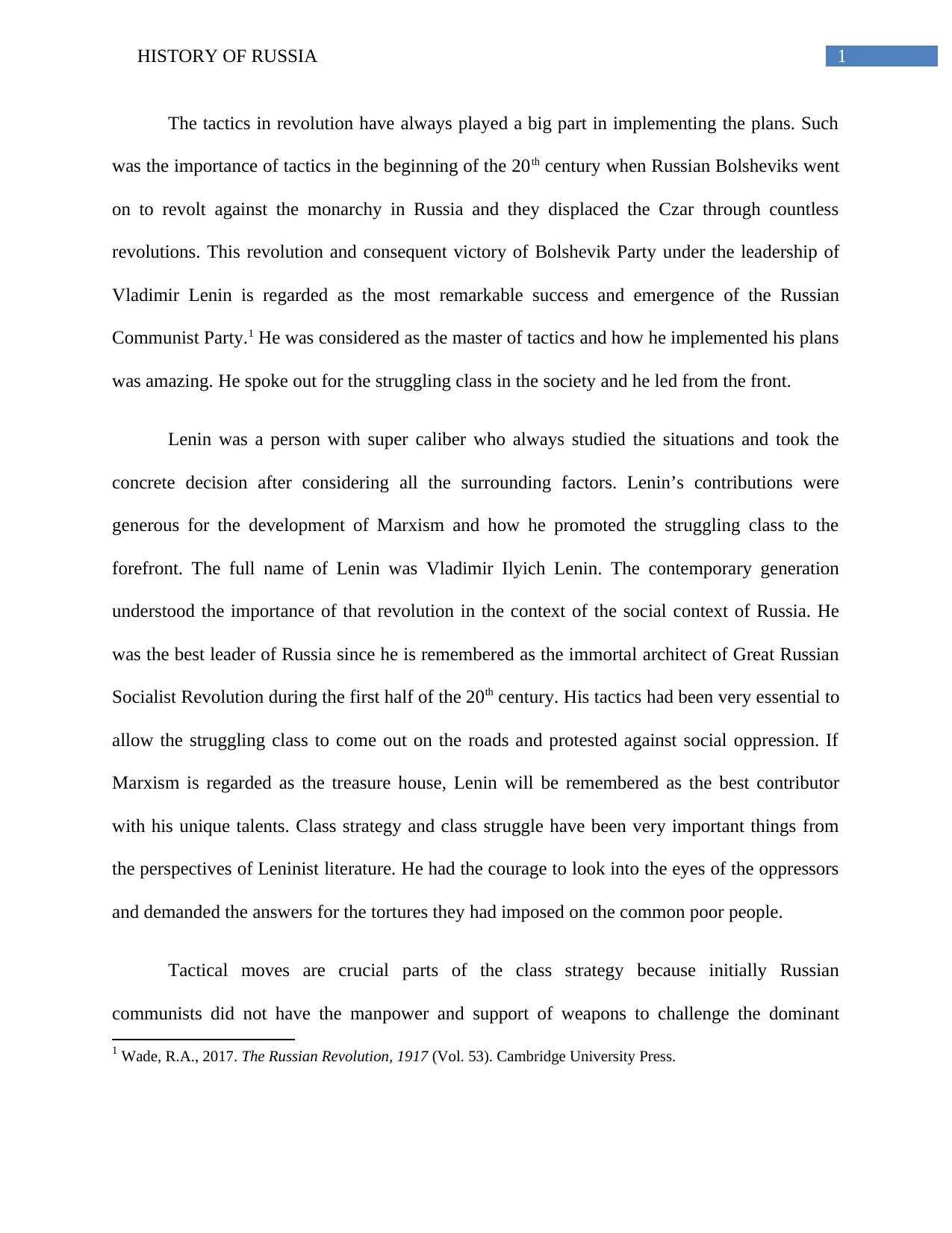
1HISTORY OF RUSSIA
The tactics in revolution have always played a big part in implementing the plans. Such
was the importance of tactics in the beginning of the 20th century when Russian Bolsheviks went
on to revolt against the monarchy in Russia and they displaced the Czar through countless
revolutions. This revolution and consequent victory of Bolshevik Party under the leadership of
Vladimir Lenin is regarded as the most remarkable success and emergence of the Russian
Communist Party.1 He was considered as the master of tactics and how he implemented his plans
was amazing. He spoke out for the struggling class in the society and he led from the front.
Lenin was a person with super caliber who always studied the situations and took the
concrete decision after considering all the surrounding factors. Lenin’s contributions were
generous for the development of Marxism and how he promoted the struggling class to the
forefront. The full name of Lenin was Vladimir Ilyich Lenin. The contemporary generation
understood the importance of that revolution in the context of the social context of Russia. He
was the best leader of Russia since he is remembered as the immortal architect of Great Russian
Socialist Revolution during the first half of the 20th century. His tactics had been very essential to
allow the struggling class to come out on the roads and protested against social oppression. If
Marxism is regarded as the treasure house, Lenin will be remembered as the best contributor
with his unique talents. Class strategy and class struggle have been very important things from
the perspectives of Leninist literature. He had the courage to look into the eyes of the oppressors
and demanded the answers for the tortures they had imposed on the common poor people.
Tactical moves are crucial parts of the class strategy because initially Russian
communists did not have the manpower and support of weapons to challenge the dominant
1 Wade, R.A., 2017. The Russian Revolution, 1917 (Vol. 53). Cambridge University Press.
The tactics in revolution have always played a big part in implementing the plans. Such
was the importance of tactics in the beginning of the 20th century when Russian Bolsheviks went
on to revolt against the monarchy in Russia and they displaced the Czar through countless
revolutions. This revolution and consequent victory of Bolshevik Party under the leadership of
Vladimir Lenin is regarded as the most remarkable success and emergence of the Russian
Communist Party.1 He was considered as the master of tactics and how he implemented his plans
was amazing. He spoke out for the struggling class in the society and he led from the front.
Lenin was a person with super caliber who always studied the situations and took the
concrete decision after considering all the surrounding factors. Lenin’s contributions were
generous for the development of Marxism and how he promoted the struggling class to the
forefront. The full name of Lenin was Vladimir Ilyich Lenin. The contemporary generation
understood the importance of that revolution in the context of the social context of Russia. He
was the best leader of Russia since he is remembered as the immortal architect of Great Russian
Socialist Revolution during the first half of the 20th century. His tactics had been very essential to
allow the struggling class to come out on the roads and protested against social oppression. If
Marxism is regarded as the treasure house, Lenin will be remembered as the best contributor
with his unique talents. Class strategy and class struggle have been very important things from
the perspectives of Leninist literature. He had the courage to look into the eyes of the oppressors
and demanded the answers for the tortures they had imposed on the common poor people.
Tactical moves are crucial parts of the class strategy because initially Russian
communists did not have the manpower and support of weapons to challenge the dominant
1 Wade, R.A., 2017. The Russian Revolution, 1917 (Vol. 53). Cambridge University Press.
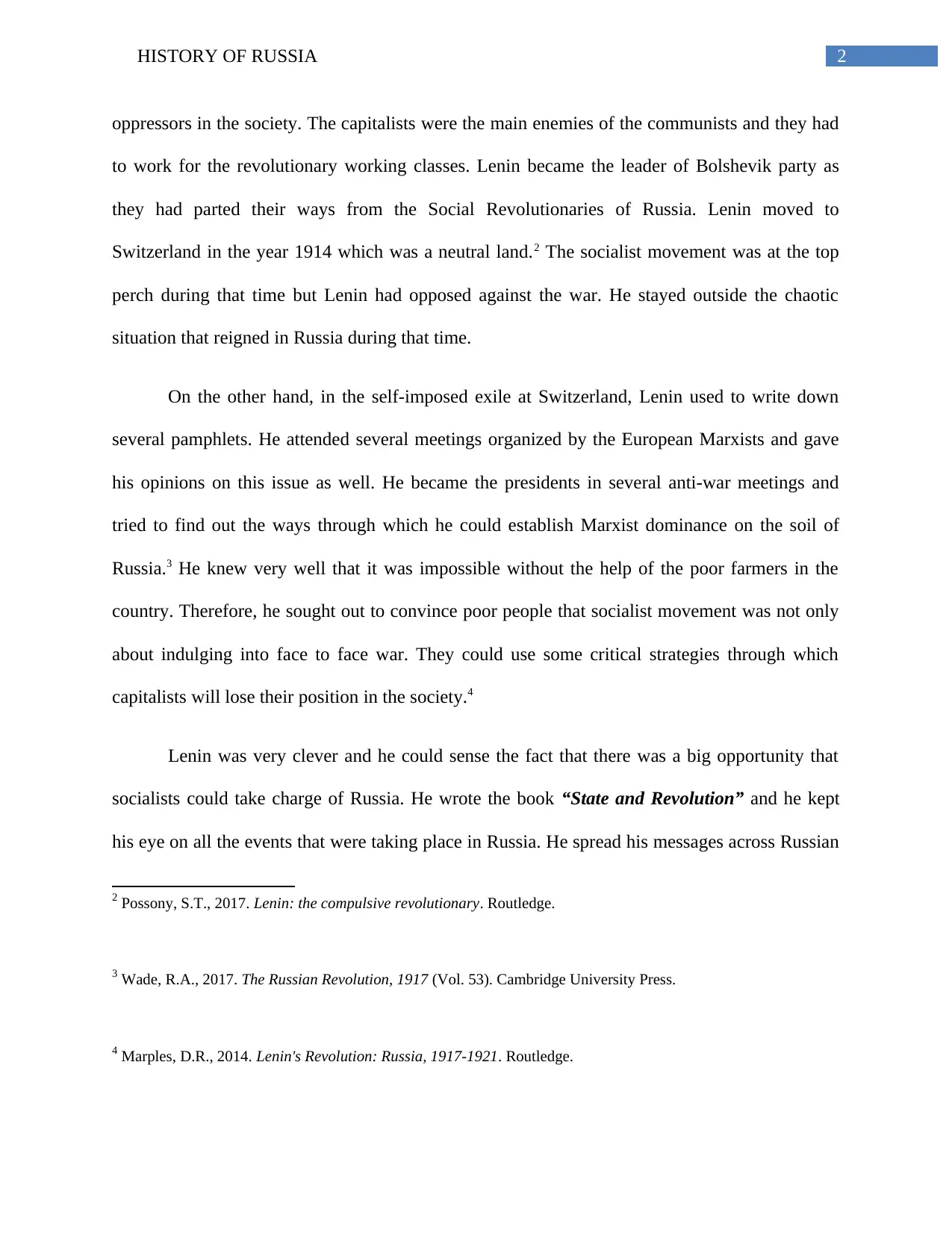
2HISTORY OF RUSSIA
oppressors in the society. The capitalists were the main enemies of the communists and they had
to work for the revolutionary working classes. Lenin became the leader of Bolshevik party as
they had parted their ways from the Social Revolutionaries of Russia. Lenin moved to
Switzerland in the year 1914 which was a neutral land.2 The socialist movement was at the top
perch during that time but Lenin had opposed against the war. He stayed outside the chaotic
situation that reigned in Russia during that time.
On the other hand, in the self-imposed exile at Switzerland, Lenin used to write down
several pamphlets. He attended several meetings organized by the European Marxists and gave
his opinions on this issue as well. He became the presidents in several anti-war meetings and
tried to find out the ways through which he could establish Marxist dominance on the soil of
Russia.3 He knew very well that it was impossible without the help of the poor farmers in the
country. Therefore, he sought out to convince poor people that socialist movement was not only
about indulging into face to face war. They could use some critical strategies through which
capitalists will lose their position in the society.4
Lenin was very clever and he could sense the fact that there was a big opportunity that
socialists could take charge of Russia. He wrote the book “State and Revolution” and he kept
his eye on all the events that were taking place in Russia. He spread his messages across Russian
2 Possony, S.T., 2017. Lenin: the compulsive revolutionary. Routledge.
3 Wade, R.A., 2017. The Russian Revolution, 1917 (Vol. 53). Cambridge University Press.
4 Marples, D.R., 2014. Lenin's Revolution: Russia, 1917-1921. Routledge.
oppressors in the society. The capitalists were the main enemies of the communists and they had
to work for the revolutionary working classes. Lenin became the leader of Bolshevik party as
they had parted their ways from the Social Revolutionaries of Russia. Lenin moved to
Switzerland in the year 1914 which was a neutral land.2 The socialist movement was at the top
perch during that time but Lenin had opposed against the war. He stayed outside the chaotic
situation that reigned in Russia during that time.
On the other hand, in the self-imposed exile at Switzerland, Lenin used to write down
several pamphlets. He attended several meetings organized by the European Marxists and gave
his opinions on this issue as well. He became the presidents in several anti-war meetings and
tried to find out the ways through which he could establish Marxist dominance on the soil of
Russia.3 He knew very well that it was impossible without the help of the poor farmers in the
country. Therefore, he sought out to convince poor people that socialist movement was not only
about indulging into face to face war. They could use some critical strategies through which
capitalists will lose their position in the society.4
Lenin was very clever and he could sense the fact that there was a big opportunity that
socialists could take charge of Russia. He wrote the book “State and Revolution” and he kept
his eye on all the events that were taking place in Russia. He spread his messages across Russian
2 Possony, S.T., 2017. Lenin: the compulsive revolutionary. Routledge.
3 Wade, R.A., 2017. The Russian Revolution, 1917 (Vol. 53). Cambridge University Press.
4 Marples, D.R., 2014. Lenin's Revolution: Russia, 1917-1921. Routledge.
⊘ This is a preview!⊘
Do you want full access?
Subscribe today to unlock all pages.

Trusted by 1+ million students worldwide
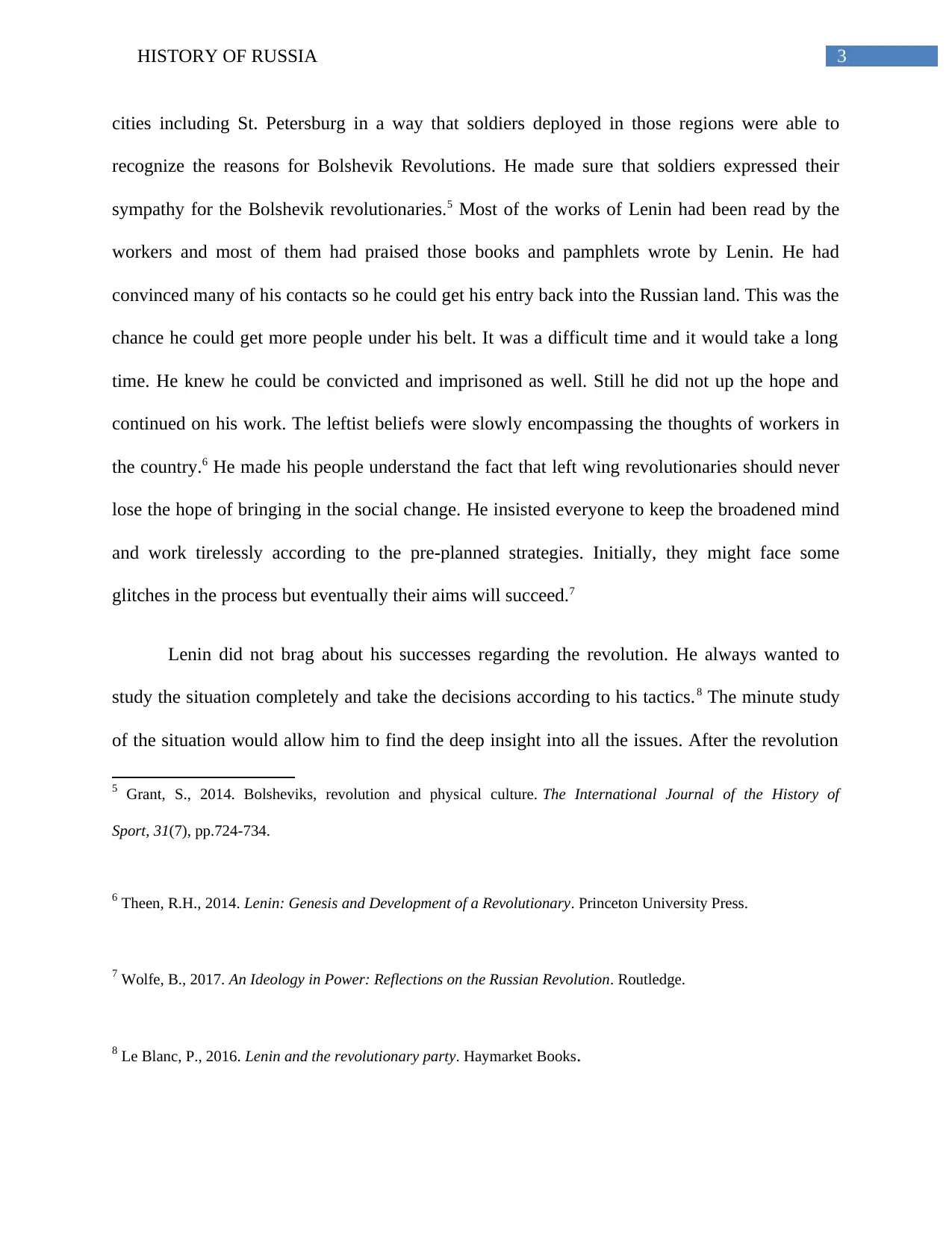
3HISTORY OF RUSSIA
cities including St. Petersburg in a way that soldiers deployed in those regions were able to
recognize the reasons for Bolshevik Revolutions. He made sure that soldiers expressed their
sympathy for the Bolshevik revolutionaries.5 Most of the works of Lenin had been read by the
workers and most of them had praised those books and pamphlets wrote by Lenin. He had
convinced many of his contacts so he could get his entry back into the Russian land. This was the
chance he could get more people under his belt. It was a difficult time and it would take a long
time. He knew he could be convicted and imprisoned as well. Still he did not up the hope and
continued on his work. The leftist beliefs were slowly encompassing the thoughts of workers in
the country.6 He made his people understand the fact that left wing revolutionaries should never
lose the hope of bringing in the social change. He insisted everyone to keep the broadened mind
and work tirelessly according to the pre-planned strategies. Initially, they might face some
glitches in the process but eventually their aims will succeed.7
Lenin did not brag about his successes regarding the revolution. He always wanted to
study the situation completely and take the decisions according to his tactics.8 The minute study
of the situation would allow him to find the deep insight into all the issues. After the revolution
5 Grant, S., 2014. Bolsheviks, revolution and physical culture. The International Journal of the History of
Sport, 31(7), pp.724-734.
6 Theen, R.H., 2014. Lenin: Genesis and Development of a Revolutionary. Princeton University Press.
7 Wolfe, B., 2017. An Ideology in Power: Reflections on the Russian Revolution. Routledge.
8 Le Blanc, P., 2016. Lenin and the revolutionary party. Haymarket Books.
cities including St. Petersburg in a way that soldiers deployed in those regions were able to
recognize the reasons for Bolshevik Revolutions. He made sure that soldiers expressed their
sympathy for the Bolshevik revolutionaries.5 Most of the works of Lenin had been read by the
workers and most of them had praised those books and pamphlets wrote by Lenin. He had
convinced many of his contacts so he could get his entry back into the Russian land. This was the
chance he could get more people under his belt. It was a difficult time and it would take a long
time. He knew he could be convicted and imprisoned as well. Still he did not up the hope and
continued on his work. The leftist beliefs were slowly encompassing the thoughts of workers in
the country.6 He made his people understand the fact that left wing revolutionaries should never
lose the hope of bringing in the social change. He insisted everyone to keep the broadened mind
and work tirelessly according to the pre-planned strategies. Initially, they might face some
glitches in the process but eventually their aims will succeed.7
Lenin did not brag about his successes regarding the revolution. He always wanted to
study the situation completely and take the decisions according to his tactics.8 The minute study
of the situation would allow him to find the deep insight into all the issues. After the revolution
5 Grant, S., 2014. Bolsheviks, revolution and physical culture. The International Journal of the History of
Sport, 31(7), pp.724-734.
6 Theen, R.H., 2014. Lenin: Genesis and Development of a Revolutionary. Princeton University Press.
7 Wolfe, B., 2017. An Ideology in Power: Reflections on the Russian Revolution. Routledge.
8 Le Blanc, P., 2016. Lenin and the revolutionary party. Haymarket Books.
Paraphrase This Document
Need a fresh take? Get an instant paraphrase of this document with our AI Paraphraser
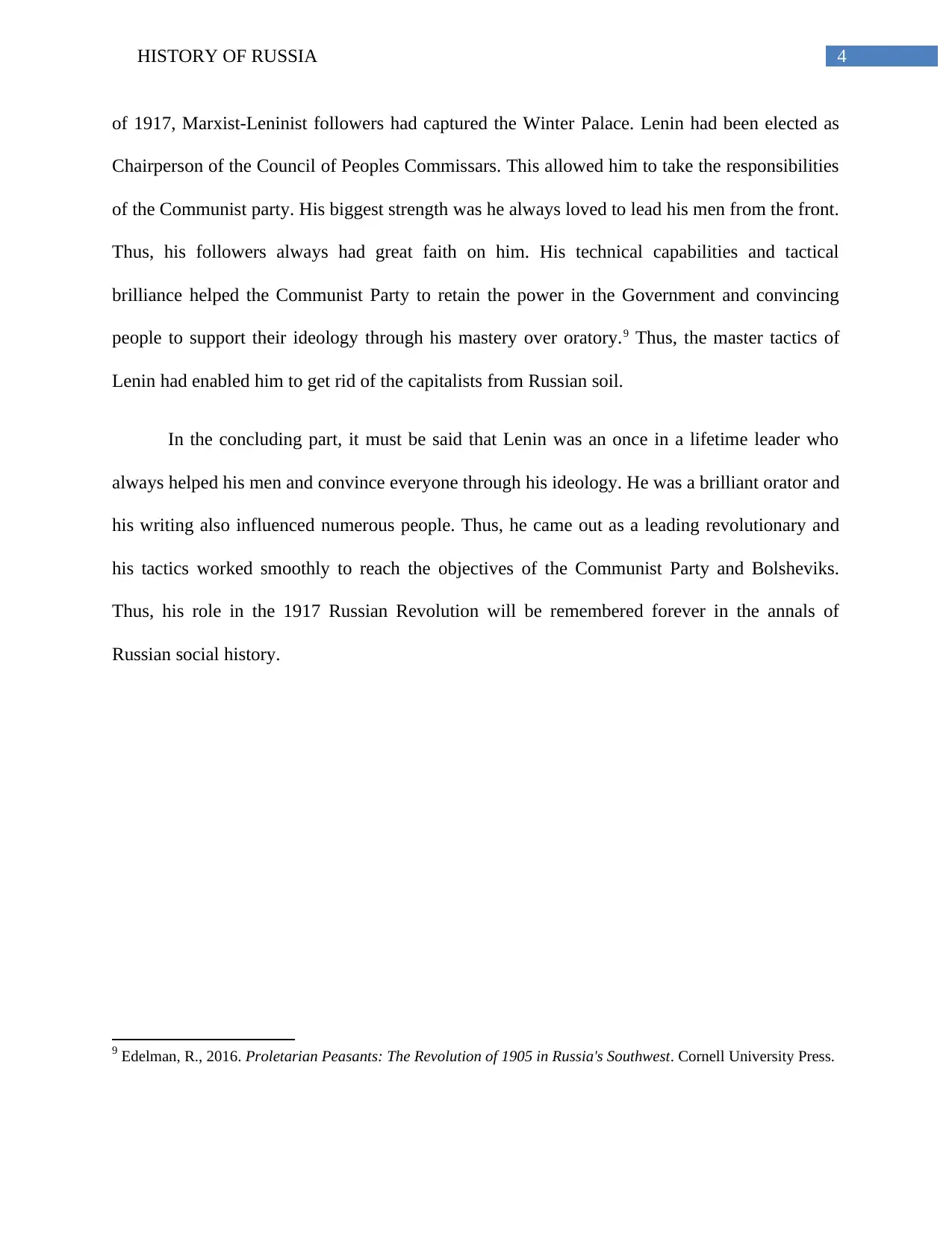
4HISTORY OF RUSSIA
of 1917, Marxist-Leninist followers had captured the Winter Palace. Lenin had been elected as
Chairperson of the Council of Peoples Commissars. This allowed him to take the responsibilities
of the Communist party. His biggest strength was he always loved to lead his men from the front.
Thus, his followers always had great faith on him. His technical capabilities and tactical
brilliance helped the Communist Party to retain the power in the Government and convincing
people to support their ideology through his mastery over oratory.9 Thus, the master tactics of
Lenin had enabled him to get rid of the capitalists from Russian soil.
In the concluding part, it must be said that Lenin was an once in a lifetime leader who
always helped his men and convince everyone through his ideology. He was a brilliant orator and
his writing also influenced numerous people. Thus, he came out as a leading revolutionary and
his tactics worked smoothly to reach the objectives of the Communist Party and Bolsheviks.
Thus, his role in the 1917 Russian Revolution will be remembered forever in the annals of
Russian social history.
9 Edelman, R., 2016. Proletarian Peasants: The Revolution of 1905 in Russia's Southwest. Cornell University Press.
of 1917, Marxist-Leninist followers had captured the Winter Palace. Lenin had been elected as
Chairperson of the Council of Peoples Commissars. This allowed him to take the responsibilities
of the Communist party. His biggest strength was he always loved to lead his men from the front.
Thus, his followers always had great faith on him. His technical capabilities and tactical
brilliance helped the Communist Party to retain the power in the Government and convincing
people to support their ideology through his mastery over oratory.9 Thus, the master tactics of
Lenin had enabled him to get rid of the capitalists from Russian soil.
In the concluding part, it must be said that Lenin was an once in a lifetime leader who
always helped his men and convince everyone through his ideology. He was a brilliant orator and
his writing also influenced numerous people. Thus, he came out as a leading revolutionary and
his tactics worked smoothly to reach the objectives of the Communist Party and Bolsheviks.
Thus, his role in the 1917 Russian Revolution will be remembered forever in the annals of
Russian social history.
9 Edelman, R., 2016. Proletarian Peasants: The Revolution of 1905 in Russia's Southwest. Cornell University Press.
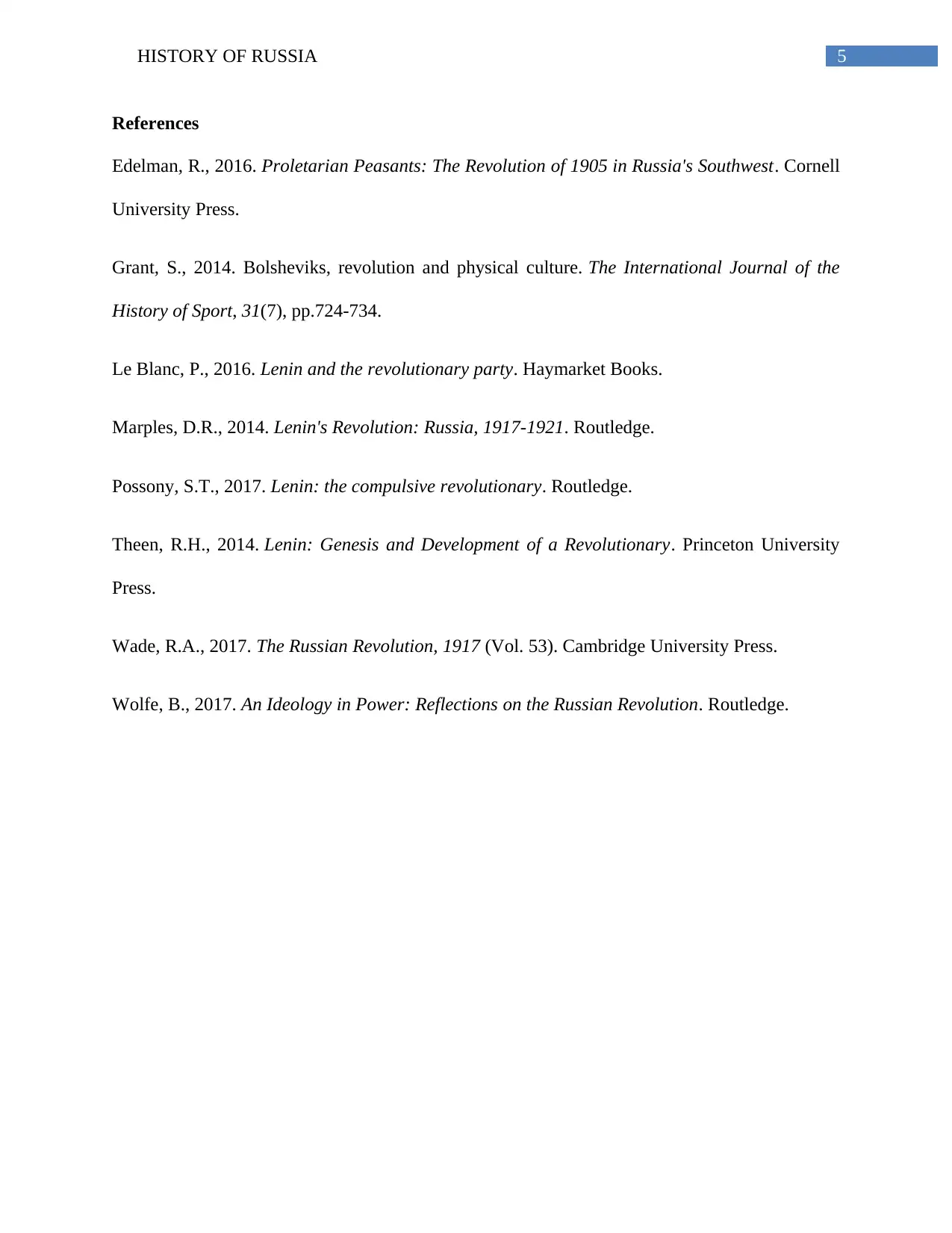
5HISTORY OF RUSSIA
References
Edelman, R., 2016. Proletarian Peasants: The Revolution of 1905 in Russia's Southwest. Cornell
University Press.
Grant, S., 2014. Bolsheviks, revolution and physical culture. The International Journal of the
History of Sport, 31(7), pp.724-734.
Le Blanc, P., 2016. Lenin and the revolutionary party. Haymarket Books.
Marples, D.R., 2014. Lenin's Revolution: Russia, 1917-1921. Routledge.
Possony, S.T., 2017. Lenin: the compulsive revolutionary. Routledge.
Theen, R.H., 2014. Lenin: Genesis and Development of a Revolutionary. Princeton University
Press.
Wade, R.A., 2017. The Russian Revolution, 1917 (Vol. 53). Cambridge University Press.
Wolfe, B., 2017. An Ideology in Power: Reflections on the Russian Revolution. Routledge.
References
Edelman, R., 2016. Proletarian Peasants: The Revolution of 1905 in Russia's Southwest. Cornell
University Press.
Grant, S., 2014. Bolsheviks, revolution and physical culture. The International Journal of the
History of Sport, 31(7), pp.724-734.
Le Blanc, P., 2016. Lenin and the revolutionary party. Haymarket Books.
Marples, D.R., 2014. Lenin's Revolution: Russia, 1917-1921. Routledge.
Possony, S.T., 2017. Lenin: the compulsive revolutionary. Routledge.
Theen, R.H., 2014. Lenin: Genesis and Development of a Revolutionary. Princeton University
Press.
Wade, R.A., 2017. The Russian Revolution, 1917 (Vol. 53). Cambridge University Press.
Wolfe, B., 2017. An Ideology in Power: Reflections on the Russian Revolution. Routledge.
⊘ This is a preview!⊘
Do you want full access?
Subscribe today to unlock all pages.

Trusted by 1+ million students worldwide
1 out of 6
Related Documents
Your All-in-One AI-Powered Toolkit for Academic Success.
+13062052269
info@desklib.com
Available 24*7 on WhatsApp / Email
![[object Object]](/_next/static/media/star-bottom.7253800d.svg)
Unlock your academic potential
Copyright © 2020–2026 A2Z Services. All Rights Reserved. Developed and managed by ZUCOL.





